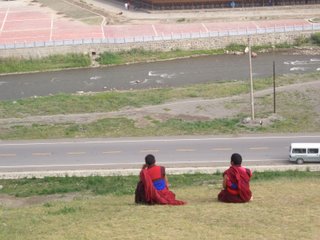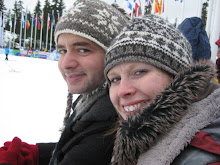
Day 4
Spent the morning at Maijishan, the mountain near Tianshui with Buddhist carvings. Interesting place, with fairly large Buddhist images carved impossibly high on a mountain, and beautiful surrounding scenery, although 6 hours out of my way in each direction was a lot for a half-day's sight-seeing. On the bus ride to Maijishan, I was off-guard and readily agreed to 20 yuan for the ride. Then I heard the people behind me saying things in Chinese like "20 yuan? Ah, they charge the foreigner more than the local people". I turned around and asked how much they paid, but they went silent. On the way back I was charged 5 yuan.
I often see things in China that make me think, "ah, Mao must be turning in his grave". On the way back from the internet cafe the night before, there were four dancing girls on the street baring their stomachs in matching outfits and dancing badly to techno music. I think it was some kind of advertisement, and there was an enthusiastic announcer who would occasionally say something in English like "1, 2, 3, go!".
Then, at around 9 or 10pm there was a phone call in my hotel room. I answered with curiosity, but I didn't understand what the girl on the other end was trying to say, and I apologized and hung up. I figured it was mostly likely the front desk, but was curious what it was they wanted. Then she called back again, and I explained that I still didn't understand what she wanted, but I started to guess when I caught phrases like "take a look at your room". She finally came up with two words in English, so there was no question what she was asking: "ni xiang bu xiang [would you like] Chinese girl?". I politely turned her down, laughing to myself about it. She then called a third time later on, letting it ring many times before I finally answered. I think this time she was mostly amused that she had a foreigner on the other end of line, greeting me in English with "Hello English boy!" and then giggling. Long gone is the China in which people were sometimes sent to jail just for sleeping together before marriage.
Failing again to get any train tickets at all heading to my next destination, I got a hard seat ticket to Lanzhou and figured I would have better luck there. On the train I met a couple of university students, who were shockingly obvious about dating each other (about two weeks ago in Zhangye I saw a couple kiss in public for the first time, the most open behavior I've seen though they were still crouching in the dark). We had a minor conversation as best as I could manage before keeping to ourselves for a few hours, but when we arrived at Lanzhou they took it upon themselves to look after me, in typical Chinese fashion (they said they were worried about "bad people" that might be around). Despite the very long line, they helped me to try to buy a train ticket (denied again, though I at least knew it wasn't my fault). I would otherwise have felt completely defeated, but they then made a phone call at a nearby store to find out about buses to Dunhuang, finding a bus leaving the next day and writing down the information for me. Three or four other people had noticed the foreigner needing assistance and gathered around, and informed my new friends that in fact there was a sleeper bus for Dunhuang I could catch leaving in an hour. So they negotiated the ticket with the bus driver for me, which probably saved me some money. When he found out it was just me going and not them, he gave them a higher price in a low voice, which really irritated me, but they got a lower price than his original asking price. We then had a quick meal, which I succeeded in paying despite their efforts, and they made sure I bought some water and got on the bus safely before going on their way. They went more than an hour out of their way to help me; sometimes, I adore Chinese people.
Day 5
The bus ride was not fun. It was meant to leave at 9pm, but because there weren't enough on board, they didn't take off until 11pm, a very common situation on Chinese buses. I was told it would arrive at Dunhuang at 4:30pm the next day, and the university students for some reason told me 12pm, but I've been in China long enough to assume we would arrive by 7pm with any luck. The sleeper bus was acceptable, though anyone bigger than me would have been physically unable to fit in the bunk and it was rather tight. There was a woman from Zhangye on the bus, which I noticed when I overheard a man ask her what good food is in Zhangye, and she was going on about the peaches ("they're this big!"). However, we suddenly had to change to a bus with seats around 9am in the morning, which I didn't mind because the seats were comfortable. Unfortunately, around 1pm we had to change again, to a very uncomfortable bus with small seats and no air-conditioning. This was just in time for the worst part of the journey, a very rough road that lasted for at least 6 hours. This was the road that Cynthia, who had been to Dunhuang before, was talking about when she said "ah good, you won't have to take the road that doesn't exist" when I told her I planned on getting the train. We were bounced around to the point that my stomach hurt and it was impossible to read or concentrate on anything, and the dust was so thick inside the bus that a mother had her daughter breath into a plastic bag. Probably at some point in my life my ass has hurt more, but I couldn't say when. I was starting to feel a little let-down, thinking it surely could get worse, so luckily the bus also broke down, in the desert with no civilization for miles. No one seemed annoyed or at all surprised by this, so we just caught some fresh air for 20 minutes before they got it running again. Eventually many of the passengers got off and the road smoothed out, so I was actually in a rather good mood when we pulled into Dunhuang - at 10 pm, 25 hours after I boarded the first bus.
Day 6 - Dunhuang
The reason people come to Dunhuang is to see the nearby Mogao grottoes, a collection of more than 700 caves filled with Buddhist art created during several dynasties in ancient China. It's one of the best-known sites in the northwest of China, and was well worth visiting. I had a wonderfully competent English tour guide, who brought us to perhaps 10 of the most interesting caves, filled with Buddha and bodhisatva statues, wall paintings, and other interesting works of art. With me on the English tour were 3 French speakers, an eccentric old German and his wife, and an Indonesian family. Pictures are forbidden, so I only managed one quick, mediocre picture of an enormous Buddha statue, the third largest in China. It's feet were almost the height of a person, and it towered over us in a very tall cave. Apparently it was carved out of the rock from top to bottom over the course of 30 years. Dunhuang as a city seems a decent place to hang out, and for the first time on the trip I'll spend the entire day without changing cities.
That evening I went to the Crescent Moon Lake, a national park of sorts immediately outside of Dunhuang. The lake itself is not thrilling, but the whole area is made up of enormous sand dunes, which for me was quite a thrill. Camel rides of an hour or two are offered for a hefty price, which was well worth doing. Me and a Chinese family were put into a camel team, which the father got a big kick out of. Riding a camel is nice and laid-back, and to me better than riding a horse. It's also not extremely comfortable, and I couldn't imagine crossing the Sahara on one. When you ride one you realize just how big they are, and the dismount involves a sudden plummet to the ground as the camel lowers its front legs first.
At night, relieved to not have to wake up early, I went in search of the night market I had heard about, which was a lively scene. There was a lot of nice hand-made artwork, but I'll wait for the famous market in Kashgar rather than loading myself down with four weeks to go. There was also a crowd of stalls selling lamb kebabs and beer, with the annoying, pushy types of vendors that congregate in tourist areas. Fighting every day to not get ripped off is getting on my nerves - Western tourists have comparitively so much more money than people here I can partly understand it, and I expect few of them notice, but I work in China and am paid Chinese money. I picked one vendor randomly, and he immediately brought out the most expensive beer he had, and even so suggested an outrageous price - 35 yuan; it was maybe worth 10, and the brand everyone drinks in this area normally costs 2. So I asked for Xiliang brand, which he said was 10 yuan, and I lazily just agreed to it. But then he charged the Chinese people that started coming 5 yuan, as if I wouldn't understand or notice. 5 yuan isn't much but out of principle I was really irritated. But before I paid and could complain three men sat down next to me, and we struck up a conversation; it turned out one was from Zhangye, and with the usual generosity I was then treated to more kebabs and beer on him. During the usual scramble between them to decide who would pay the whole bill, I thought it might likely include what I had ordered before but I wasn't sure. At any rate I was so irritated at being cheated again I just walked off, since the vendor wasn't paying attention. He quickly found me, quite annoyed and saying I hadn't paid, but at least I made him chase me down. As I gave him the money I told him the beer was 5 yuan, but he had to make change for me and stuck with the higher price, trying to get rid of me as quickly as possible. I didn't make a further issue of it, but I'll have to be more vigilant against all the cheats along the tourist routes.
My hostel room in Dunhuang had three beds, and I knew I had a roommate when I checked in because someone's stuff was all over the room. I couldn't decide if it must be a male or female, because there was both a Disney towel and a dozen used cigarettes. I figured it must be a male, because in China a man with a Disney towel is much more likely than a woman who smokes. However, when I entered the room that night I walked in on a young girl in her underwear changing her clothes. Oops. I returned a few minutes later, apologizing and trying to start a conversation by asking which city she was from. She looked confused so I tried asking a different way, thinking my pronounciation was poor, but this time she said "I'm Japanese". Oops. But I do have a fascination with Japan so I had a conversation with "Yoshi" (yes, as in the Mario character) as best her English could handle. She handed me her card, which basically said "photography student", as is the Japanese custom. She is traveling for six months so I can only imagine how many cards she brought. I guess in China she does ok because she can write down the characters for people to see, which they got from the Chinese although the spoken language is completely different. I wonder what kind of reactions Japanese tourists get here; the Chinese hate them, mostly because of WWII, but they're also terrible at identifying where foreigners are from. Even if I didn't want to save money I would still stay in hostels; it's fascinating meeting people from countries I may or may not ever see.




